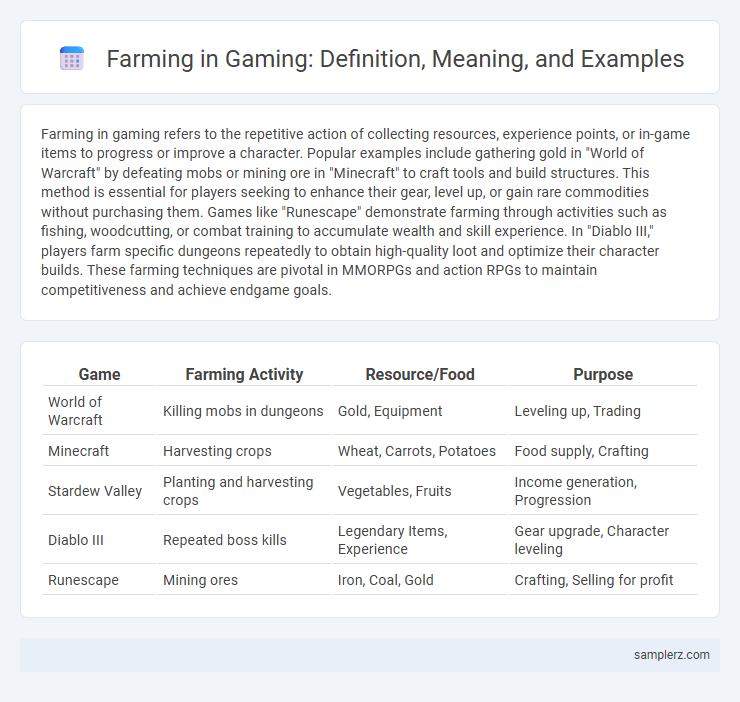Farming in gaming refers to the repetitive action of collecting resources, experience points, or in-game items to progress or improve a character. Popular examples include gathering gold in "World of Warcraft" by defeating mobs or mining ore in "Minecraft" to craft tools and build structures. This method is essential for players seeking to enhance their gear, level up, or gain rare commodities without purchasing them. Games like "Runescape" demonstrate farming through activities such as fishing, woodcutting, or combat training to accumulate wealth and skill experience. In "Diablo III," players farm specific dungeons repeatedly to obtain high-quality loot and optimize their character builds. These farming techniques are pivotal in MMORPGs and action RPGs to maintain competitiveness and achieve endgame goals.
Table of Comparison
| Game | Farming Activity | Resource/Food | Purpose |
|---|---|---|---|
| World of Warcraft | Killing mobs in dungeons | Gold, Equipment | Leveling up, Trading |
| Minecraft | Harvesting crops | Wheat, Carrots, Potatoes | Food supply, Crafting |
| Stardew Valley | Planting and harvesting crops | Vegetables, Fruits | Income generation, Progression |
| Diablo III | Repeated boss kills | Legendary Items, Experience | Gear upgrade, Character leveling |
| Runescape | Mining ores | Iron, Coal, Gold | Crafting, Selling for profit |
Understanding Farming Mechanics in Video Games
Farming mechanics in video games involve repetitive actions to collect resources, experience points, or in-game currency essential for character progression and crafting. Titles like World of Warcraft and Stardew Valley exemplify diverse farming strategies, where players optimize time and effort by selecting high-yield areas or efficient techniques. Mastering these mechanics enhances gameplay efficiency, enabling faster advancement and improved resource management.
Popular Games Known for Farming Systems
Games like Stardew Valley and Farming Simulator 22 are popular for their intricate farming systems, allowing players to plant crops, raise livestock, and manage resources efficiently. In these games, players engage in activities such as planting seasonal crops, harvesting yields, and constructing farm buildings to optimize production. Titles like Animal Crossing: New Horizons also incorporate farming mechanics, enabling players to grow fruits and flowers, contributing to their village's economy and aesthetics.
Resource Farming: Gathering Materials and Currency
Resource farming in gaming involves repeatedly gathering valuable materials such as ores, herbs, or crafting components to enhance character progression and equipment upgrades. Players often focus on farming currency like gold or credits to purchase rare items and improve their in-game economy. Efficient resource farming techniques include identifying high-yield zones, optimizing inventory management, and utilizing in-game tools or boosts to maximize collection rates.
XP Farming: Leveling Up Fast
XP farming in gaming involves repetitive activities designed to gain experience points quickly, such as defeating low-level enemies or completing specific quests repeatedly. Popular examples include grinding mobs in open-world games like World of Warcraft or performing daily challenges in mobile RPGs like Raid: Shadow Legends. Efficient XP farming strategies optimize character progression, enabling faster access to advanced skills and high-level content.
Item and Loot Farming Strategies
Item and loot farming strategies in gaming involve repetitive gameplay actions to efficiently gather valuable resources, equipment, or currency. Players often target specific high-yield monsters, boss encounters, or treasure chests in games like World of Warcraft or Diablo III to maximize rare item drops and optimize inventory upgrades. Utilizing optimized routes, appropriate gear, and consumables enhances farming efficiency and increases overall in-game wealth.
Gold and In-Game Currency Farming Methods
Gold farming in gaming often involves repetitive activities like defeating high-yield monsters, completing daily quests, or participating in special events to accumulate valuable in-game currency. Players frequently utilize automated bots or farming parties to maximize their efficiency, targeting areas rich in resources or rare drop items that can be sold for gold. Efficient gold farming boosts a player's ability to purchase upgrades, unlock premium content, and enhance overall gameplay progression.
Best Locations for Efficient Farming
The best locations for efficient farming in gaming often feature high spawn rates of valuable resources or mobs, such as the Misty Forest in World of Warcraft for rare herbs and ores. Zones like the Dragon's Lair in Diablo III provide optimal experience points and loot drops due to dense enemy populations and frequent respawns. Players targeting gold farming in games like Final Fantasy XIV favor areas like the Spider's Den for both monster kills and valuable item drops.
Automated Farming Techniques in Modern Games
Automated farming techniques in modern games like Minecraft utilize redstone mechanisms and command blocks to automate crop harvesting and resource collection, significantly reducing manual effort. Games such as World of Warcraft leverage bots and scripts to manage repetitive farming tasks, enabling efficient gathering of materials like herbs and ores. These systems enhance gameplay by optimizing resource acquisition, allowing players to focus on strategy and exploration.
Farming Communities and Marketplace Trading
Farming communities in gaming thrive by cultivating in-game resources, such as crops, animals, or rare materials, which players then trade in virtual marketplaces for profit or progression. These communities often develop specialized farming techniques and collaborate to maximize yield, fostering a dynamic economy where supply and demand influence item prices. Marketplace trading enables players to exchange farming goods, driving competition and creating opportunities for immersive economic strategies within games like World of Warcraft and Stardew Valley.
Risks and Ethics of Farming in Online Games
Farming in online games involves repetitive actions to accumulate in-game resources, but it poses risks such as account suspension and exposure to scams. Ethical concerns arise when players exploit game mechanics or use bots, disrupting game balance and fairness. Developers continuously update policies and implement anti-cheat systems to maintain a fair gaming environment.

example of farming in gaming Infographic
 samplerz.com
samplerz.com